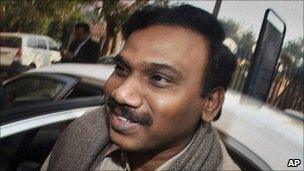Profile: India ex-telecoms minister A Raja
- Published

A Raja quit in November amid what has been described as India's biggest corruption investigation
A low-profile minister in one of the most high-profile ministries in India, Andimuthu Raja is charged with conspiracy, forgery and fraud in what is being described as India's biggest corruption scandal.
In May India's former telecoms minister was released on bail after 15 months in prison.
Mr Raja denies underselling telephone licences at an estimated cost to the exchequer of nearly $40bn.
As the telecoms minister, he looked after one of the fastest growing sectors in the country.
Mr Raja - who is from the low-caste Dalit community formerly known as "untouchables" - quickly became the face of his Dravida Munnetra Kazhagam (DMK) party, which derives its strength from the lower castes.
He started out as a student politician in his native state, Tamil Nadu, and rose fast in his party.
He was elected to parliament for the first time in 1996. Although he lost his seat in the next general election in 1998, he bounced back to regain his parliamentary seat the following year.
The young politician was nominated by his party as a junior rural development minister in the BJP-led government in 1999: the DMK was then an ally of the Hindu nationalist party.
He was soon moved to the health ministry as a junior minister where he made his mark. Mr Raja was often praised by the prime minister at the time, Atal Behari Vajpayee, for his "good work" in the health ministry, aides say.
In December 2003, the DMK walked out of the alliance with the BJP and A Raja resigned from his post.
His fortunes did not ebb after Congress won the 2004 elections. He was nominated by his party to become a full-fledged environment minister. Environmental groups complain that Mr Raja did not do enough to push clean energy and that he was too pro-industry.
Three years later, in May 2007, Mr Raja was promoted to a more high-profile post: communications and information technology minister.
From being a rather shy, unassuming politician, he had become an articulate minister who had won the trust of his party.
Then, in late 2010, the so-called 2G spectrum scandal broke and Mr Raja was sent to prison in February 2011.
The trial of Mr Raja, MP Kanimozhi and 12 other people from telecom firms or the government who have been charged in the corruption scandal, began in November 2011.
Nonetheless, Mr Raja has managed to retain the political backing of his mentor and party leader, M Karunanidhi, arguably the most influential politician in southern India.
- Published19 May 2010